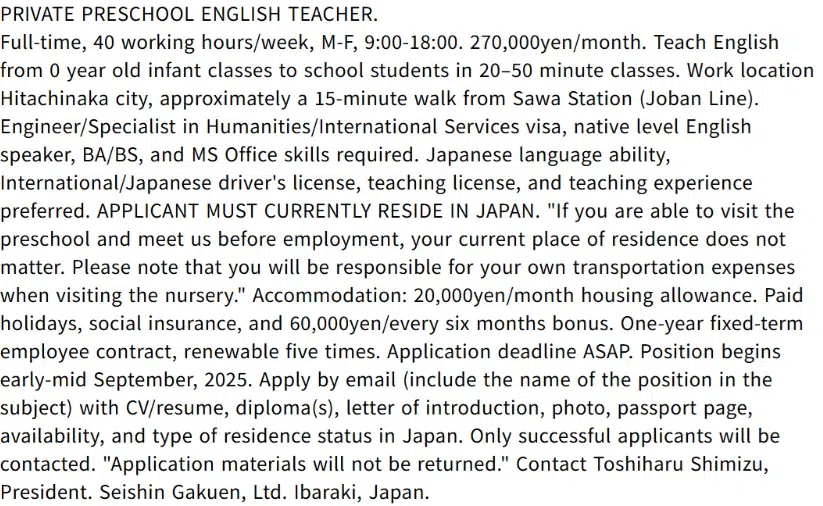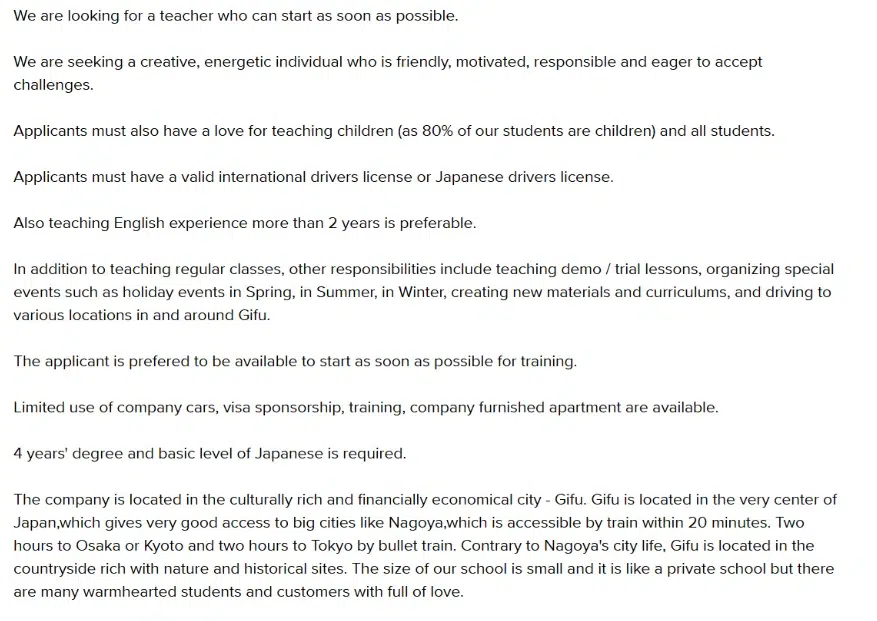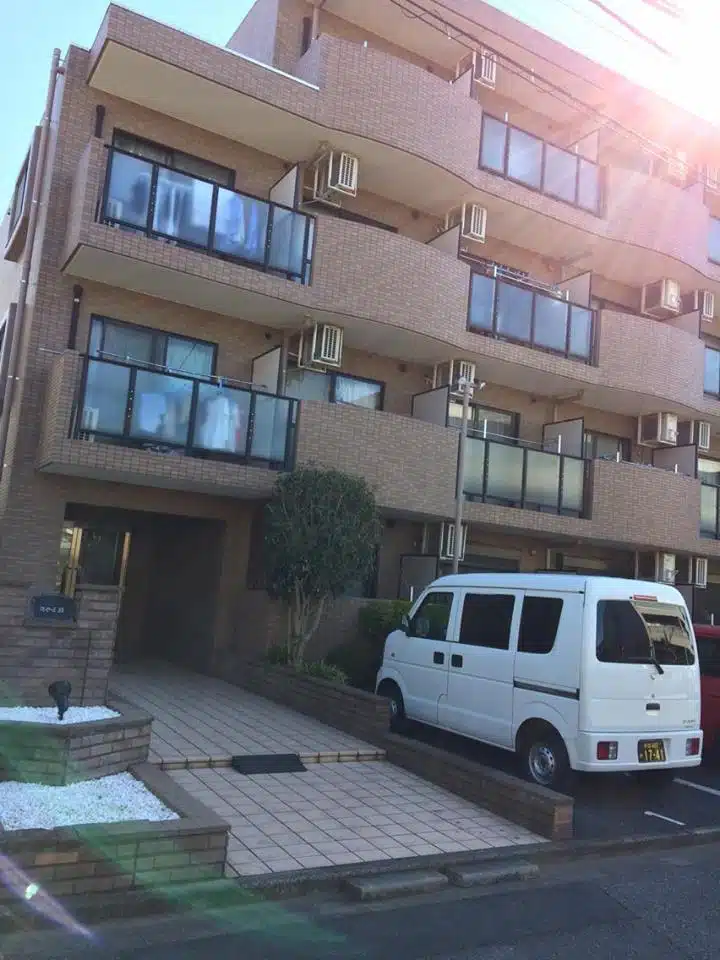Is Housing Included With TEFL Jobs In Japan (Here’s What The Data Says)
Table of Contents
- Introduction
- Do jobs include housing?
- Do employers help?
- Is free housing common?
- Will your employer cover you?
If you’re considering teaching English in Japan, one of the biggest questions is: will your school provide housing, or will rent eat into your salary?
As you may well know, TEFL teaching vacancies in the Middle East (such as Saudi Arabia, the UAE and Qatar) and certain Asian countries, like South Korea, often include accommodation as part of their job package.
Is it the same situation in Japan? Do TEFL jobs in Japan typically include housing or offer assistance?
Do TEFL jobs in Japan include free housing or housing allowances?
Before we hit the stats, let’s clarify a few things first. In the TEFL landscape, some teaching positions may offer assistance with accommodation for teachers.
This can be in the form of:
- An apartment or house, free for the use of the teacher
- An apartment or house for the use of the teacher, at a cheaper-than-market-value rate (which usually comes out of your salary each month)
- A room in a shared apartment or house
- A monetary add-on to your salary to contribute to your accommodation (which you organise yourself). This is usually referred to as a housing allowance or housing subsidy.
These apartments and houses can be fully-furnished, partly-furnished or not furnished at all. Utility bills like internet, water and electricity may be covered by the employer or may be the responsibility of the teacher.
Top tip: When considering a TEFL contract, always check the fine print for terms and conditions related to benefits such as accommodation.
Read more: What To Expect In A TEFL Contract
So, in Japan…
It turns out that accommodation is NOT usually included in job packages:
Based on our dataset of 209 job listings, almost 20% include free housing or a direct housing allowance.
Where provided, housing allowances were typically modest — around ¥20,000/month, well below average rent prices in most cities.
To put this into perspective, a typical one-bedroom apartment in Tokyo can set you back around ¥95,000, but Tokyo is always going to be more expensive than other cities in Japan.
Our research shows that on average, you should budget around ¥50,000 – ¥100,000 a month for accommodation, depending on where you are going to live.
TTA alum Matthew lives in Funabashi, just east of Tokyo. He (in 2025) lives in a 1LDK apartment (1 bedroom, a living room, a dining area and a kitchen) with his wife. They pay ¥80,000 a month. As he says:
Our rent is ¥80,000 per month, and that includes basic furnishings, internet access, and utilities like electricity. It’s a comfortable setup that gives us enough space to live and work without feeling cramped. While it’s not the cheapest option available, the convenience and peace of mind are well worth it.
Do employers help with housing in other ways?
Yes. While full financial support is rare, 41% of jobs offered some form of housing assistance. This support typically comes in the form of:
- Help finding an apartment or dealing with landlords
- Pre-arranged accommodation on behalf of the teacher
- Support with “key money”* or move-in costs
- Access to school-arranged housing at market or reduced rates
* Key money is a non-refundable payment made by a tenant to a landlord as a form of gratitude for the opportunity to rent from them.
This kind of logistical or partial financial support is relatively common, especially in non-urban areas.
As you can imagine, finding accommodation in a country where you don’t speak the language and aren’t familiar with the customs, cultures or even the local area, is an especially daunting thought.
For example, let’s look at three job advertisements:

This elementary school offers to arrange a private room in a shared house at a cost to the teacher of ¥81,000 a month, or an apartment for ¥98,000 a month (approximately 30% and 35% of your salary, respectively).

This contract for a preschool position offers a monthly housing allowance of ¥20,000, while this next one offers a furnished company apartment.

As Matthew points out: For new arrivals in Japan, opting for company-arranged housing can significantly reduce the stress of apartment hunting, especially since some landlords are hesitant to rent to foreigners without a Japanese guarantor.
For those living alone, company housing may cost slightly less and typically includes shared amenities.
Is free or subsidised housing more common with certain job types or locations?
Let’s get real: Japan is a surprisingly big country with massive variations in the cost of living. Housing in Tokyo is a whole different ball game from housing in Kyoto.
Housing support is more likely to be offered in rural or smaller cities, where schools need stronger incentives to attract teachers. In contrast, TEFL jobs in Tokyo, Osaka, and other major cities don’t include housing as often, likely due to higher competition and demand – though they can offer assistance in terms of securing accommodation.
Jobs in kindergartens and international preschools also tend to offer housing assistance more frequently than public school or corporate language training roles.
Should you expect your employer to cover housing?
No – the data makes it clear: you should plan to pay for your own housing in Japan.
However, there’s a reasonable chance (~41%) that your employer will assist in some way.
Having said that, if you’re applying for a teaching job in Japan from outside the country, you’ll know exactly what is being offered to you before you sign your contract. In other words, you’ll know if your accommodation is being taken care of or if you need to take that into consideration in your budget.

TTA teacher Tara’s apartment block in Funabashi

And the view of Mount Fuji from her flat
In a nutshell, while free housing is not a standard benefit in TEFL jobs in Japan, many employers do provide assistance, from logistical support to small subsidies. Always ask about housing during the application process, and factor rent into budgeting when planning your move.
Table of Contents
- Introduction
- Do jobs include housing?
- Do employers help?
- Is free housing common?
- Will your employer cover you?
If you’re considering teaching English in Japan, one of the biggest questions is: will your school provide housing, or will rent eat into your salary?
As you may well know, TEFL teaching vacancies in the Middle East (such as Saudi Arabia, the UAE and Qatar) and certain Asian countries, like South Korea, often include accommodation as part of their job package.
Is it the same situation in Japan? Do TEFL jobs in Japan typically include housing or offer assistance?
Do TEFL jobs in Japan include free housing or housing allowances?
Before we hit the stats, let’s clarify a few things first. In the TEFL landscape, some teaching positions may offer assistance with accommodation for teachers.
This can be in the form of:
- An apartment or house, free for the use of the teacher
- An apartment or house for the use of the teacher, at a cheaper-than-market-value rate (which usually comes out of your salary each month)
- A room in a shared apartment or house
- A monetary add-on to your salary to contribute to your accommodation (which you organise yourself). This is usually referred to as a housing allowance or housing subsidy.
These apartments and houses can be fully-furnished, partly-furnished or not furnished at all. Utility bills like internet, water and electricity may be covered by the employer or may be the responsibility of the teacher.
Top tip: When considering a TEFL contract, always check the fine print for terms and conditions related to benefits such as accommodation.
Read more: What To Expect In A TEFL Contract
So, in Japan…
It turns out that accommodation is NOT usually included in job packages:
Based on our dataset of 209 job listings, almost 20% include free housing or a direct housing allowance.
Where provided, housing allowances were typically modest — around ¥20,000/month, well below average rent prices in most cities.
To put this into perspective, a typical one-bedroom apartment in Tokyo can set you back around ¥95,000, but Tokyo is always going to be more expensive than other cities in Japan.
Our research shows that on average, you should budget around ¥50,000 – ¥100,000 a month for accommodation, depending on where you are going to live.
TTA alum Matthew lives in Funabashi, just east of Tokyo. He (in 2025) lives in a 1LDK apartment (1 bedroom, a living room, a dining area and a kitchen) with his wife. They pay ¥80,000 a month. As he says:
Our rent is ¥80,000 per month, and that includes basic furnishings, internet access, and utilities like electricity. It’s a comfortable setup that gives us enough space to live and work without feeling cramped. While it’s not the cheapest option available, the convenience and peace of mind are well worth it.
Do employers help with housing in other ways?
Yes. While full financial support is rare, 41% of jobs offered some form of housing assistance. This support typically comes in the form of:
- Help finding an apartment or dealing with landlords
- Pre-arranged accommodation on behalf of the teacher
- Support with “key money”* or move-in costs
- Access to school-arranged housing at market or reduced rates
* Key money is a non-refundable payment made by a tenant to a landlord as a form of gratitude for the opportunity to rent from them.
This kind of logistical or partial financial support is relatively common, especially in non-urban areas.
As you can imagine, finding accommodation in a country where you don’t speak the language and aren’t familiar with the customs, cultures or even the local area, is an especially daunting thought.
For example, let’s look at three job advertisements:

This elementary school offers to arrange a private room in a shared house at a cost to the teacher of ¥81,000 a month, or an apartment for ¥98,000 a month (approximately 30% and 35% of your salary, respectively).

This contract for a preschool position offers a monthly housing allowance of ¥20,000, while this next one offers a furnished company apartment.

As Matthew points out: For new arrivals in Japan, opting for company-arranged housing can significantly reduce the stress of apartment hunting, especially since some landlords are hesitant to rent to foreigners without a Japanese guarantor.
For those living alone, company housing may cost slightly less and typically includes shared amenities.
Is free or subsidised housing more common with certain job types or locations?
Let’s get real: Japan is a surprisingly big country with massive variations in the cost of living. Housing in Tokyo is a whole different ball game from housing in Kyoto.
Housing support is more likely to be offered in rural or smaller cities, where schools need stronger incentives to attract teachers. In contrast, TEFL jobs in Tokyo, Osaka, and other major cities don’t include housing as often, likely due to higher competition and demand – though they can offer assistance in terms of securing accommodation.
Jobs in kindergartens and international preschools also tend to offer housing assistance more frequently than public school or corporate language training roles.
Should you expect your employer to cover housing?
No – the data makes it clear: you should plan to pay for your own housing in Japan.
However, there’s a reasonable chance (~41%) that your employer will assist in some way.
Having said that, if you’re applying for a teaching job in Japan from outside the country, you’ll know exactly what is being offered to you before you sign your contract. In other words, you’ll know if your accommodation is being taken care of or if you need to take that into consideration in your budget.

TTA teacher Tara’s apartment block in Funabashi

And the view of Mount Fuji from her flat
In a nutshell, while free housing is not a standard benefit in TEFL jobs in Japan, many employers do provide assistance, from logistical support to small subsidies. Always ask about housing during the application process, and factor rent into budgeting when planning your move.
 United States
US
United States
US








